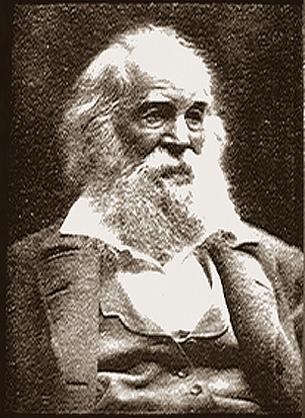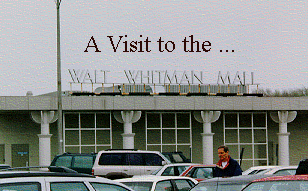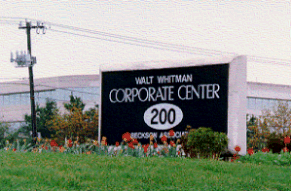 Walt
At the Mall
Walt
At the Mall




A mall is a strange sort commemoration for a great American poet--
or is it? In fact, in the town of Huntington on Long Island, where
Walt Whitman was born in 1819 and spent the very early years of his life,
there is now a mall donning his name.
The knee-jerk response at the sight of such seeming
incompatibility is, perhaps, hard to get beyond. The commercialism,
the consumerism, the seamy underbelly of consumption-- the implications
that tend to go hand and hand with a mall tend to go uncelebrated, if not
thrust under the rug, or out to the suburbs. Malls are supposedly
the unwieldy hulks of modern convenience, the trough from which all the
necessary and excessive objects of subsistence are dispersed. Experiencing
power shopping is not usually likened to that of a nice verse of poetry.
Indeed, malls, often equally uninspiring and charmless clusters of the
same sort of stores, tend to offer the same shopping experiences.
They are also just as often vilified as fueling the deterioration of meaningful
contact between people. The days of casual, yet personal relationships
between the shopper and their local storekeepers have come and gone.
On the other hand there is the matter of mall culture.
Within this framework, a mall may in fact be celebrated and even furthermore
considered as a center, if not a Mecca of sorts, of pop culture.
In this light, a mall is neither blight nor abhorrence of culture, but
merely the next phase of its development. It is an honest barometer
for what people want nowadays from their culture. Indeed, the majority
of Americans have most likely been to a mall; a good portion of them probably
found it enjoyable enough to return again and again. There is no
denying that their status as a new American institution. Despite
the fact that now have their proverbial fingers stuck in the marrow of
cultures around the world, malls began as a homegrown phenomena, an icon
rooted in American soil.
In the midst of this provocative battleground, where cultural purists cite
the mall and all other signs of pop culture as signs of the apocalypse,
there stands Walt Whitman. He lived in a time before mall culture,
before shopping-as-sport-- what relevance could he have with regard to
shopping malls? And why would anyone see it fitting to connect the
two? Yet, this is not the first time that Whitman has been plopped
down in the middle of power shoppers' territory:
What thoughts I have of you tonight, Walt Whitman,
for I walked down the sidestreets
under the trees with a head
-ache self-conscious looking at
the full moon.
In my hungry fatigue, and shopping for images, I
went into the neon fruit supermarket,
dreaming of your
enumeration's!
What peaches and what penumbras! Whole families
shopping at night! Aisles
full of husbands! Wives in the
avocados, babies in the tomatoes!--
and you, Garcia Lorca, what
were you doing down by the watermelons?
I saw you, Walt Whitman, childless, lonely old grubber,
poking among the meats in the refrigerator
and eyeing the
grocery boys. . .
Indeed, Allen Ginsberg's "A Supermarket in California"
similarly joins two seemingly incompatible figureheads. He places
Whitman within a supermarket, though a less pungent stigma-charged shopping
institution, it is similarly in line with the new tradition of excess
associated with the mall. And Ginsberg's treatment of it is exultant;
a supermarket is a part of American life and Whitman is there. He
reconstructs Whitman contemporarily not as a snob rejecting such places
on higher principle, but as one who accepts it for what it is.
Here, as in the case of the Walt Whitman Mall, Whitman, the champion of
earthy first-hand experiences, is linked with what many interpret as a
numbing fount of consumerism. Indeed, Whitman reveled in the gritty
experiences of man, of nature, but also of industry, of work, of
the city. He rallied behind gleaning the gamut of experiences from
life. He called for his readers to soar with him in search of empathy:
What do you see Walt Whitman? .
. .
I see a great round wonder rolling
through space,
I see diminute farms, hamlets,
ruins, graveyards, jails,
factories, palaces,
hovels, huts of barbarian, tents
of nomads .
. .
(Leaves of Grass (1891-92),
;
"Salut au Monde!" (sec.4))
And so, too, perhaps malls and supermarkets?
It is not entirely inconceivable, that despite the seemingly paradoxical
collection of ideals, that Whitman would indeed at least "see" such places
and with the acknowledging cry, "Salut!" Perhaps, as a poet who celebrated
what went uncelebrated in his time, he would appreciate the irony, the
ambivalence surround the topic, concluding that such a provocative homage
is in fact suitable. If not suitable, it is at least telling about
the society that is proud to commemorate the poet all along a continuum
of monuments. Indeed, such a tribute provides an interesting insight
into American culture. In this light, one ought to open the door
to appreciation of this type of memorial. One might even come to
embrace the Walt Whitman Mall, and perhaps even the Walt Whitman Corporate
Center, just one more mile down the road.



HOME
CONTINUE:
BRIDGES OF WALT






